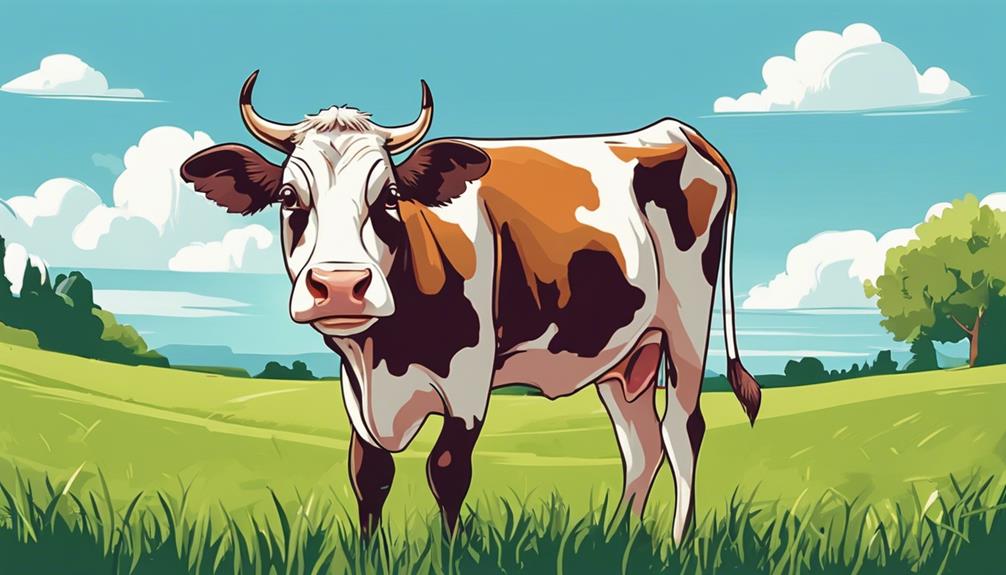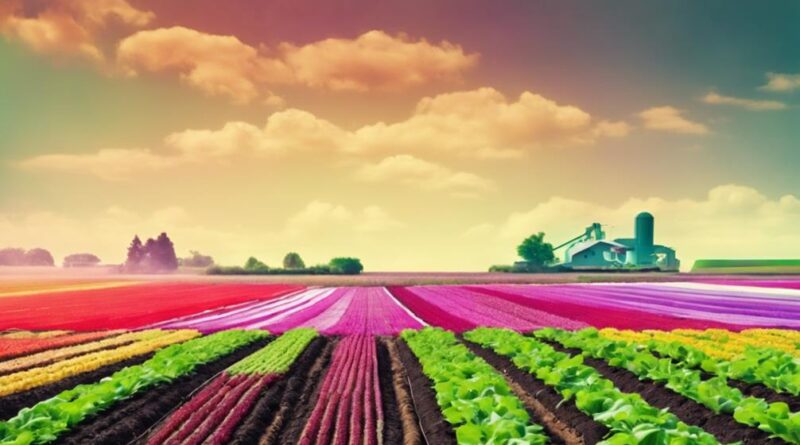Why Choose Organic Farming Over Conventional Methods?
When it comes to food, you have a choice: conventional or organic farming. The decision you make can impact not only your health but also the environment.
Consider this – organic farming offers a myriad of benefits that extend beyond what meets the eye. From healthier soil to reduced pesticide usage, the advantages of choosing organic go far beyond the surface.
So, why should you opt for organic farming over conventional methods?
Health Benefits
When choosing between organic farming and conventional methods, you may find that organic produce offers clearer health benefits. Organic farming practices typically involve reduced toxins compared to conventional methods. Pesticides, herbicides, and synthetic fertilizers are minimized or avoided in organic farming, which can lead to a lower risk of exposure to harmful chemicals for consumers. By choosing organic products, you're making a conscious decision to prioritize your health and well-being by reducing your intake of potentially harmful substances.
Furthermore, organic produce may contribute to improved immunity due to its higher nutrient content. Organic fruits and vegetables are often richer in essential vitamins, minerals, and antioxidants compared to conventionally grown counterparts. These nutrients play a crucial role in supporting your immune system and overall health. By consuming organic foods, you're providing your body with the necessary building blocks to strengthen your immune response and defend against illnesses.
Environmental Impact
Organic farming practices have been shown to have a lower environmental impact compared to conventional methods. One significant way in which organic farming benefits the environment is through reduced emissions. Organic farms produce fewer greenhouse gases compared to conventional farms, mainly because they refrain from using synthetic fertilizers and pesticides that contribute to carbon emissions. By avoiding these chemicals, organic farming helps combat climate change and promotes a healthier atmosphere.
Moreover, water conservation is another crucial aspect where organic farming shines. Organic practices focus on enhancing soil health, which in turn improves the soil's water retention capacity. This means that organic farms require less irrigation compared to conventional farms, ultimately reducing the strain on water resources. By optimizing water usage, organic farming not only conserves this precious resource but also helps prevent water pollution caused by runoff from chemical-laden fields.
Soil Quality
Enhancing soil quality is a fundamental aspect of sustainable farming practices. By choosing organic farming methods over conventional ones, you can significantly improve soil health and ultimately boost crop yield. Here are three reasons why focusing on soil quality is crucial:
- Nutrient-Rich Soil: Organic farming techniques such as composting and crop rotation help maintain soil health by replenishing essential nutrients. This nutrient-rich soil provides plants with the necessary components for growth, resulting in healthier crops with higher nutritional value.
- Improved Soil Structure: Conventional farming practices often lead to soil compaction and erosion, which can degrade soil quality over time. Organic farming, on the other hand, promotes better soil structure through the use of cover crops and reduced tillage. This improved soil structure enhances water retention and aeration, creating a more favorable environment for plant roots to thrive.
- Enhanced Microbial Activity: Organic farming encourages the growth of beneficial soil microorganisms that play a vital role in nutrient cycling and disease suppression. These microbes help break down organic matter into nutrients that are more accessible to plants, contributing to improved overall soil health and increased crop yield.
Biodiversity Preservation
Preserving biodiversity is essential for maintaining ecosystem balance and ensuring the long-term sustainability of agricultural practices. Organic farming plays a crucial role in biodiversity preservation through practices such as habitat protection and species conservation. By avoiding synthetic chemicals and promoting natural ecosystems, organic farms create environments where various plant and animal species can thrive.
One key aspect of biodiversity preservation in organic farming is habitat protection. Organic farms often incorporate diverse crop rotations, cover crops, and hedgerows, providing habitats for a wide range of beneficial insects, birds, and other wildlife. These habitats support natural pest control mechanisms, reducing the need for harmful pesticides and fostering a balanced ecosystem.
Furthermore, organic farming promotes species conservation by avoiding the use of genetically modified organisms (GMOs) and synthetic pesticides that can harm non-target organisms. This approach helps preserve genetic diversity within plant and animal populations, contributing to the overall resilience of ecosystems. By cultivating a variety of crops and utilizing traditional farming methods, organic farmers safeguard the genetic resources essential for sustainable agriculture.
Pesticide Usage
To understand the impact of pesticide usage in farming, consider its role in shaping agricultural practices and environmental sustainability. Pesticides have long been relied upon in conventional farming to combat pests and diseases, but their extensive use has raised concerns about the negative effects on both human health and the environment. Here are three key points to consider:
- Pesticide Alternatives: Organic farming offers a range of pesticide alternatives that are derived from natural sources. These alternatives, such as neem oil, diatomaceous earth, and beneficial insects, provide effective pest control without the harmful effects of synthetic pesticides. By adopting these natural solutions, farmers can reduce their reliance on chemical pesticides and promote a healthier farming ecosystem.
- Reduced Toxins, Safer Produce: One of the primary benefits of reducing pesticide usage in organic farming is the production of safer and healthier produce. By eliminating synthetic pesticides, organic farmers minimize the exposure of consumers to harmful toxins commonly found in conventionally grown fruits and vegetables. Choosing organic produce means supporting a farming method that prioritizes the well-being of both consumers and the environment.
- Environmental Impact: Excessive pesticide usage can have detrimental effects on the environment, including soil degradation, water contamination, and harm to non-target organisms. Organic farming practices, with their emphasis on natural pest management strategies, help preserve biodiversity and promote sustainable agricultural practices that benefit the planet in the long term. By reducing pesticide usage, organic farming plays a crucial role in protecting ecosystems and promoting environmental sustainability.
Nutrient Content
Organic farming methods typically result in higher nutrient content in crops compared to conventionally grown produce. This is because organic farmers prioritize soil health, using natural fertilizers like compost and manure to enrich the soil with essential nutrients. As a result, organic crops are often richer in vitamins, minerals, and antioxidants that are beneficial for your health.
When you choose organic produce, you can enjoy the benefits of increased yields without compromising on quality. Organic farming practices focus on enhancing the soil structure and promoting biodiversity, which translates to crops that are more nutrient-dense. These nutrient-dense foods not only provide you with essential vitamins and minerals but also contribute to improved taste. Many people find that organic fruits and vegetables have a more flavorful and vibrant taste compared to conventionally grown produce.
In addition to the improved taste, organic crops are also free from synthetic pesticides and genetically modified organisms (GMOs). By choosing organic, you can reduce your exposure to harmful chemicals and support sustainable farming practices that prioritize both human health and the environment. Next, we'll explore how organic farming methods contribute to animal welfare, providing you with a holistic view of the benefits of choosing organic over conventional farming practices.
Animal Welfare

Enhancing the well-being of farm animals is a fundamental aspect of sustainable agriculture practices. When choosing organic farming over conventional methods, you're opting for a system that prioritizes ethical treatment and livestock welfare. Here are three reasons why animal welfare is better in organic farming:
- No Routine Antibiotics: In organic farming, the use of antibiotics solely for growth promotion or disease prevention is prohibited. This means that animals aren't routinely given antibiotics, reducing the risk of antibiotic resistance and promoting healthier livestock.
- Access to Outdoor Areas: Organic farming standards require that animals have access to outdoor areas where they can engage in natural behaviors such as grazing and foraging. This freedom of movement and access to the outdoors contribute to better animal welfare compared to confined conventional farming practices.
- Higher Animal Welfare Standards: Organic farms adhere to strict animal welfare standards that prioritize the well-being of the animals. This includes providing ample space for animals to move around, ensuring access to clean water and nutritious food, and promoting natural social behaviors within the herd or flock.
Sustainability
Considering the environmental impact of farming methods is crucial in ensuring long-term sustainability in agriculture. Organic farming offers a more sustainable approach compared to conventional methods. By prioritizing soil health through natural practices like crop rotation and composting, organic farming promotes resource management and reduces soil degradation. This leads to improved food security as healthier soils are more resilient to pests and droughts, ensuring consistent crop yields.
Climate change is a pressing issue that affects agriculture worldwide. Organic farming helps combat climate change by reducing greenhouse gas emissions through the avoidance of synthetic fertilizers and pesticides. Additionally, organic practices like agroforestry and cover cropping sequester carbon, mitigating the impacts of climate change on food production.
Choosing organic farming over conventional methods also aligns with ethical practices. Organic farmers prioritize biodiversity conservation, promoting the health of pollinators and beneficial insects essential for crop production. By avoiding harmful chemicals, organic farming protects water sources from contamination, benefiting both the environment and human health.
Frequently Asked Questions
Are Organic Farming Practices More Labor-Intensive Compared to Conventional Methods?
Organic farming practices can indeed be more labor-intensive compared to conventional methods. This is due to the emphasis on manual weed control, composting, and crop rotation. However, the extra effort pays off in improved soil health and long-term sustainability.
While it may require more hands-on work in the short term, the labor efficiency of organic farming methods ultimately benefits both the environment and the quality of the produce.
How Does Organic Farming Affect the Local Economy and Communities?
When it comes to organic farming, the economic benefits are significant. By choosing organic, you contribute to local economies, supporting small-scale farmers and businesses. This leads to community development by creating jobs and fostering a sustainable agricultural model.
What Are Some Challenges That Organic Farmers Face in Terms of Marketing and Distribution?
When it comes to challenges in marketing and distribution, organic farmers often struggle with reaching a wider audience due to limited resources and competition.
To overcome these obstacles, they need to devise innovative distribution strategies that highlight the benefits of organic products.
Are There Any Government Policies or Subsidies That Support Organic Farming?
Government incentives and subsidies are essential for supporting organic farming. These policies offset the higher costs of organic certification requirements and encourage farmers to adopt sustainable methods through financial assistance and regulations. Consumer education initiatives, backed by subsidies, raise awareness about the benefits of organic products, reducing market barriers for organic farmers.
How Do Organic Farming Practices Impact Food Security and Access to Nutritious Foods in Underserved Communities?
Organic farming practices can positively impact food security and access to nutritious foods in underserved communities. By promoting sustainable farming methods, you can help address food insecurity and provide healthier options for those in need.
Community impact is significant as organic farming supports local economies and fosters a closer connection between producers and consumers.
Choosing organic can make a real difference in ensuring everyone has access to quality, nutritious food.
Conclusion
When considering whether to choose organic farming over conventional methods, the numerous benefits are clear.
From improved health benefits and environmental impact to preserving soil quality and biodiversity, organic farming offers a more sustainable and ethical approach to agriculture.
By reducing pesticide usage, increasing nutrient content, and prioritizing animal welfare, organic farming not only benefits individuals but also the planet as a whole.
Make the switch to organic farming for a healthier, more sustainable future.
